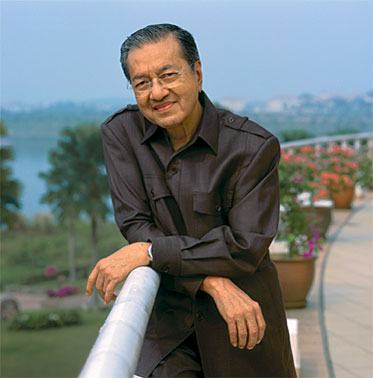 |
 |
 |
 |
 |
 |
|
|
 |
 |
 |
 I'll Do It My Way
I'll Do It My Way
Without Anwar or the global economy, Mahathir goes it alone
[09/14/1998]
|
|
 |
 Indicates premium content Indicates premium content |
|
 |
 |
 |
 |
 |
 |
 |
 |
 |
 |
|
E-mail your letter to the editor
|
|
 |
 |
 |
 |
|
|
 |
TARA SOSROWARDOYO FOR TIME |
| LION IN WINTER: Malaysia's former PM Mahathir has been ouspoken in his criticism of his successor, Abdullah Badawi |
|
 |
| Not the Retiring Type |
 |
 |
 |
 |
 |
Malaysia's former leader, Mahathir Mohamad, is taking on his successor in a rancorous fight over the future of the nation
|
 |
 |
 |
 |
 |
By Hannah Beech | Putrajaya |
 |
 |
 |
 |
 |
 |
 |
 |
 |
 |

Posted Monday, October 30, 2006; 20:00 HKT
The golden spires of Putrajaya, Malaysia's new administrative capital, shimmer in the tropical heat. Below them, manicured lawns and neat villas housing civil servants line the spotless avenues. Barely a blade of grass is out of place in this modern cityscape, which sprung out of a former palm-oil plantation a decade ago courtesy of a single man's vision. But there is one road in Putrajaya that is different. Although the path affords a telescopic view of the onion-domed citadel that is the new prime-ministerial office, this strip of asphalt is mysteriously overgrown with weeds and scrub. No gleaming skyscrapers have taken root here. Only one building stands forlornly at the road's dead end: the office of former Prime Minister Mahathir Mohamad, the man whose two-decade building spree turned Malaysia into an economic tiger and whose grandiose dream included the construction of Putrajaya itself. The irony for the 81-year-old Mahathir must be overwhelming: Is this really how the story of one of Asia's modernizing forces is to conclude, at the dead end of an unkempt road in the futurist metropolis he created?
Three years ago, the architect of modern Malaysia ended his 22-year rule by handing over power to Abdullah Ahmad Badawi, a devoutly Muslim scion of the political élite. Dr. M, as the physician turned strongman is known in Malaysia, promised to exit gracefully—and quietly. For a while, he kept his word. Mahathir put together his personal library—which includes such diverse tomes as Euclid's Elements, Margaret Thatcher's autobiography and The Complete Idiot's Guide to Understanding Islam—and even opened a bakery on the resort island of Langkawi. But by June of this year, Dr. M could no longer hold his famously fiery tongue. Abdullah, he charged, was misguided in canceling several megaprojects the ex-PM had greenlighted, including a $4 billion railway and a proposed bridge to Singapore. Weeks later, Mahathir was hinting that Abdullah should step down, alleging corruption and nepotism within the new administration—albeit without offering proof of any wrongdoing.
On Oct. 22, the pair met for two hours, stoking hopes of reconciliation. No such luck. Last week, Mahathir continued to thunder against his handpicked successor, accusing him of involvement in the U.N.'s tarnished oil-for-food program in Iraq and of creating a "police state" in which Mahathir's criticisms could not be heard. He charged that Abdullah was dismantling his legacy—and Malaysia's future. "I thought that I have done most of the things that will serve us for the next 100 years," Mahathir told TIME at his Putrajaya office. "All that remains is for people to just continue. Don't reverse what has already been done." In a written response to TIME last week, Abdullah countered: "When I became Prime Minister, I encouraged more openness and did not want to muzzle different views. We are a democracy, and it is [Mahathir's] right to speak; he is free to say what he wants ... But it is unfortunate that he is making wild allegations."
Just days before the November general assembly of the United Malays National Organization (UMNO), the ruling party to which both Mahathir and Abdullah belong, party insiders worry that their ongoing feud could cleave a coalition that has maintained power for five decades. Certainly, Mahathir may be acting out of a wish to protect what he considers his—and Malaysia's—legacy, but the venom of his attacks suggests something more personal. "[Mahathir] wants to bring down Abdullah," claims Mohamed Nazri Abdul Aziz, Abdullah's minister responsible for law and parliamentary affairs, who also served under Mahathir. "He wants to force him to quit. He needs to be told he is no longer Prime Minister. His campaign is not for the sake of the country but for himself."
The tensions highlight the fundamental challenges that Malaysia faces. Since gaining independence in 1957, the former British colony has been transformed from a backwater nation dependent on rubber and tin into an industrialized regional power that is one of the world's largest producers of semiconductors and hard-disk drives. Mahathir's name is synonymous with this remarkable transition. But those glorious growth rates and thrusting skyscrapers came at a cost. To maintain his grip on power and build the monuments that would win Malaysia global recognition—administrative capital Putrajaya; the Petronas Towers, for a time the world's tallest edifices; the Multimedia Super Corridor, an Asian take on Silicon Valley; and Southeast Asia's first Formula One Grand Prix track—Mahathir undermined less flashy but no less important institutions: Parliament, the civil service, the judiciary, the media.
Continued...
|
|




